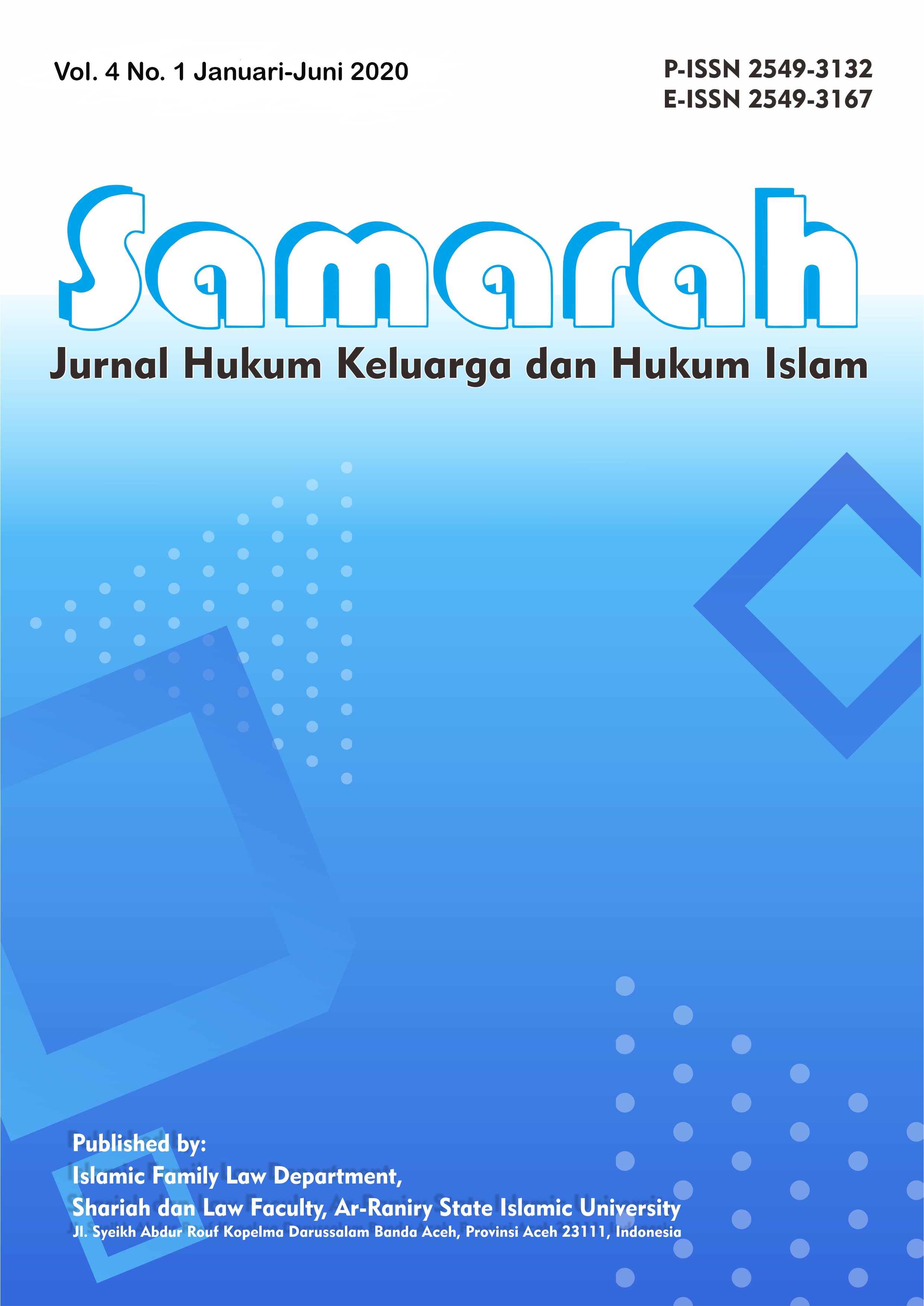Parental Rights and Obligations to Children in the Era of Industrial Revolution 4.0 (Islamic Family Law perspective)
DOI:
https://doi.org/10.22373/sjhk.v4i1.6899Keywords:
Rights and Obligations, Parents, Islamic Family LawAbstract
In accordance with the current development of the current era of globalization is very fast developing, especially digital technology called the era of revolution Industry 4.0 where the existence of technology and information can be accessed anytime and by anyone, so that positive and negative impacts on the rights and obligations of parents to children in the family. This study uses a qualitative approach by collecting data through library research techniques, then analyzed in the perspective of Islamic family law. The method used is descriptive qualitative which describes data related to the rights and obligations of parents to children in the revolutionary 4.0 era in the perspective of Islamic family law. The focus of the problem in this study is how the rights and obligations of parents towards children in the 4.0 revolution industry era in the perspective of Islamic family law. The results of this study, parents have rights and obligations which are the responsibility of actualizing the rights of children in protecting, controlling, educating, maintaining respect and protecting children in the family.
References
Aziz Abdul, Siswi SMP di Cilacap Dicabuli Teman Kenal Media Sosial. 13/8/2019. https://www.merdeka.com/peristiwa/siswi-smp-di-cilacap-dicabuli-teman-kenalan-media-sosial.html. Diakses tagal 13 Januari 2020
Basuki R. Dian,Pencarian Makna di Tengah Perkembangan Pesat Teknologi. Bandung: Mizan, 2001.
Bukhari, Hadits 9 Imam. Jakarta: Lidwa Pustaka, 2010.
Departemen Agama, al-Quran dan Terjemah. Bandung: Diponegoro, 2006.
Djamaluddin Ahdar, Wanita dan Pembinaan Generasi Muda. Jurnal Al-Maiyyah, Volume 11 No. 1 Januari-Juni 2018.
Djamarah, Pola Komunikasi Orang Tua dan Anak dalam Keluarga (Perspektif Pendidikan Islam). Jakarta: Renika Cipta, 2004.
Ghozali Rahman Abdul, Fiqh Munakahat. Jakarta: Kencana, 2008.
Id.wikipedia.org/wiki/Industri_4.0. Diakses pada tanggal 8 Januari 2020.
Ilyas Hamim, Perempuan Tertindas:Kajian Hadis-Hadis (Misoginis). Yogyakarta: Elsaq Press, 2013.
Mardani, Hukum Keluarga Islam di Indonesia. Jakarta: Prenamedia Group, 2016.
Masruhan, Metode Penelitian (Hukum). Surabaya: UIN Sunan Ampel Press, 2014.
Morissan, Teori Komunikasi Individu Hingga Massa. Jakarta: Kencana Pernada Media Group, 2016.
Mutiara Indah, Siswi SMP di Pontianak Dikeroyok Siswi SMA Gara-gara Urusan Cowok.https://news.detik.com/berita/d-4503194/siswi-smp-di-pontianak-dikeroyok-siswi-sma-gara-gara-urusan-cowok. Diakses tagal 13 Januari 2020.
Rafeldi Mediya, Kompilasi Hukum Islam dan Undang-Undang Perkawinan, Wakaf dan Penyelenggaraan Haji. Jakarta: Alika, 2016.
Ridwan Saleh Muhammad, Poligami dalam Hukum Islam dan Perundang-Undangan di Indonesia. Cet I. Makasar: Alauddin University Pers, 2011.
Sahrani Sohari, Fikih Munakahat. Jakarta: Rajagrafindo Persada, 2010.
Santrock W. John, Perkembangan Anak. Jakarta: Airlangga, 2007.
Semiawan. R, Pendidikan Keluarga dalam Era Global. Jakarta: Tema Baru, 2008.
Shihab Qurais M, Pengantin al-Quran Kalung Permata Buat Anak-Anakku. Jakarta: Lentera Hati. 2007.
Sujarweni Wiratna, Metode Penelitian. Yogyakarta: Pustaka Baru Press, 2014.
Sunarto, Komunikasi Interpersonal. Yogyakarta: Graha Ilmu, 205.
Susianti, Komunikasi Interpersonal Sebuah Tinjauan Psikologis dan Perspektif Islam. Yogyakarta: Lintera Perss, 2015.
Syarifuddin Amir, Hukum Perkawinan Islam di Indonesia, Antara Fiqih Munakahat dan Undang-Undang Perkawinan. Cet 5. Jakarta: Kencana, 2014.
Tapsscott Don, Yang Muda Merubah Dunia. Jakarta: Gramedia Pustaka, 2012.
Umro Latifatul Ida, Peran Orang Tua dalam Mendidik Anak Sejak Dini Secara Islami di Era Milenial 4.0. Jurnal Ta’lim : Jurnal Studi Pendidikan Islam, Vol. 2 No. 2 Juli 2019.
Undang-Undang Republik Indonesia Nomor 20 Tahun 2003 Tentang Sistem Pendidikan Nasional Pasal 1 Ayat 1. Jakarta, 2003.
Zhallina Nuryus, Kecanduan Gadget pada Usia Dini Semangkin Menghawtirkan. https://www.suara.com/yoursay/2019/12/11/135739/kecanduan-gadget-pada-usia-dini-semakin-menghawatirkan. Diakses tagal 13 Januari 2020

Downloads
Published
Issue
Section
License
Authors who publish in Samarah: Jurnal Hukum Keluarga dan Hukum Islam agree to the following terms:
- Authors retain copyright and grant the journal right of first publication with the work simultaneously licensed Attribution-ShareAlike 4.0 International (CC BY-SA 4.0) that allows others to share the work with an acknowledgment of the work's authorship and initial publication in this journal.
- Authors are able to enter into separate, additional contractual arrangements for the non-exclusive distribution of the journal's published version of the work (e.g., post it to an institutional repository or publish it in a book), with an acknowledgment of its initial publication in this journal.
- Authors are permitted and encouraged to post their work online (e.g., in institutional repositories or on their website) prior to and during the submission process, as it can lead to productive exchanges, as well as earlier and greater citation of published work. (See The Effect of Open Acces)








